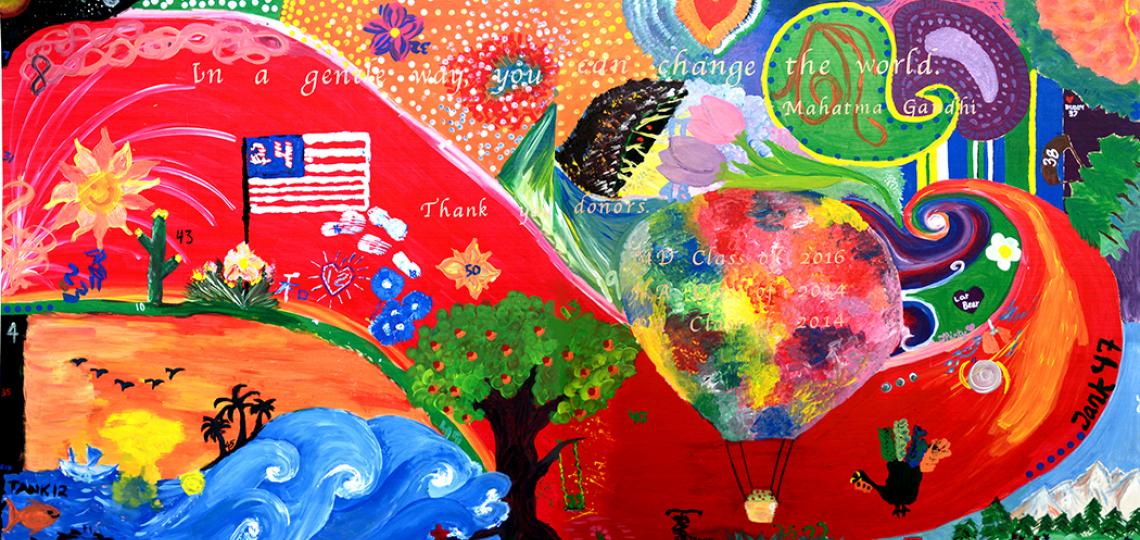
Students from the classes of 2014 and 2016 contributed to this mural at the end of their anatomy lab training. Each student wrote a special message to their first patient in honor of the men and women who donated their bodies to the Willed Body Program.
Q: Will my body automatically be accepted into the Willed Body Program once I sign and return the donor form?
A: No. The decision to accept or reject the donation is always made at the time of death. Therefore, it would be wise to have an alternative plan in the event we are unable to accept the donation.
Q: What conditions would prevent the department from accepting my body?
A: Extensive burns, trauma, surgery, extreme obesity or emaciation, beginning stages of decomposition, and the presence, or suspected presence, of contagious disease (hepatitis, HIV, tuberculosis), edema, suicide, etc. and if organs have been removed for transplantation.
Q: Who pays to have my body transported to Baylor College of Medicine?
A: The Willed Body Program arranges removals and provides transportation from within a 100 mile radius of the city limits of Houston. If death occurs outside of the Houston area, the family must make arrangements with a funeral director to provide transportation to Baylor College of Medicine. The family is responsible for these costs.
Q: Will I (or my family) be paid for donating my body?
A: No. Donating one's body to medical science is a gift to the receiving institution.
Q: If I am out of the state when I die, will Baylor College of Medicine still accept my body?
A: Generally no, because of the time and cost involved in transporting a body from out of state, it is recommended that you explore the possibility of donating your body to the nearest medical school.
Q: Does a funeral director do the embalming and is my family responsible for this expense?
A: The embalming procedure usually takes place at the medical school by an individual licensed in mortuary science once the body is received. The cost is assumed by the Willed Body Program.
Q: What about the cost of cremation?
A: The Willed Body Program makes the arrangements and pays for cremation. If the family requests (in writing) the return cremains, there is a special handling fee of $165.
Q: Will Baylor College of Medicine conduct any research relevant to the cause of death and provide my family with a report of their findings?
A: No. The bodies received are used primarily for the purpose of medical education in the instruction of anatomy. There are no autopsies performed and no pathological reports prepared. In few instances, specific research is conducted by several departments within the college.
Q: How long will my body be used by Baylor College of Medicine?
A: Baylor College of Medicine may use each body for up to three years for teaching purposes and limited research. At the end of that time the body is cremated; every effort is made to return the cremains based upon the instructions provided by the family for final disposition.
Q: Can my family have a funeral service before my body is brought to Baylor College of Medicine?
A: We prefer to receive the body as soon as possible after death has occurred. In most cases, our donors opt to have a memorial service without the body present. However, a funeral is possible prior to the donation but the funeral director needs to contact the Willed Body Program first for specific embalming instructions.
Q: Does the department ever refuse donations because they have an adequate supply of bodies?
A: Baylor College of Medicine needs a certain number of bodies in order to maintain its teaching program. There is a possibility that from time to time we may refuse a donation if our supply exceeds our needs.
Q: How can I leave my body to medical science?
A: Upon request, information and donor forms authorizing the donation of the body to science will be mailed to you. The completion of these forms does not require the services of a lawyer or a notary. After the returned documents have been reviewed by the Willed Body Program, you will be sent a letter and a donor identification card.
Q: Does age, disease, or amputation make the donation unacceptable?
A: There is no upper age limit for whole body donation; however, autopsied bodies and amputations do preclude acceptance. Medical conditions that would prevent acceptance as a donor include: hepatitis, HIV, tuberculosis, edema, suicide and if organs have been removed for transplantation.
Extensive trauma to the body at the time of death, advanced decomposition, or extreme obesity would also make the remains unsuitable for anatomical study.
Q: Who may serve as a witness to my donation?
A: Anyone 21 years or older, preferably someone expected to be a survivor, may act as a witness. Two signatures are required on our donation forms.
Q: Should the donor inform someone of the bequest?
A: Yes. Your next of kin should be notified since they are responsible under the law for the disposition of your remains. Discuss your plan with those close to you so that your wishes may be clearly understood.
If at the time of death the next of kin or another close family member expresses regret about the donation, the Willed Body Program will relinquish all claim to the remains. It is also advisable for a donor to notify his or her physician and attorney of the arrangements.
Q: Will any payment be received for the body?
A: No payment may be made in connection with the body donation. This policy is in accordance with State laws, and all institutions accepting remains must comply with it.
Q: If a bequest is made, can the gift be rescinded?
A: Yes, if the request to rescind is made in writing by the donor.








